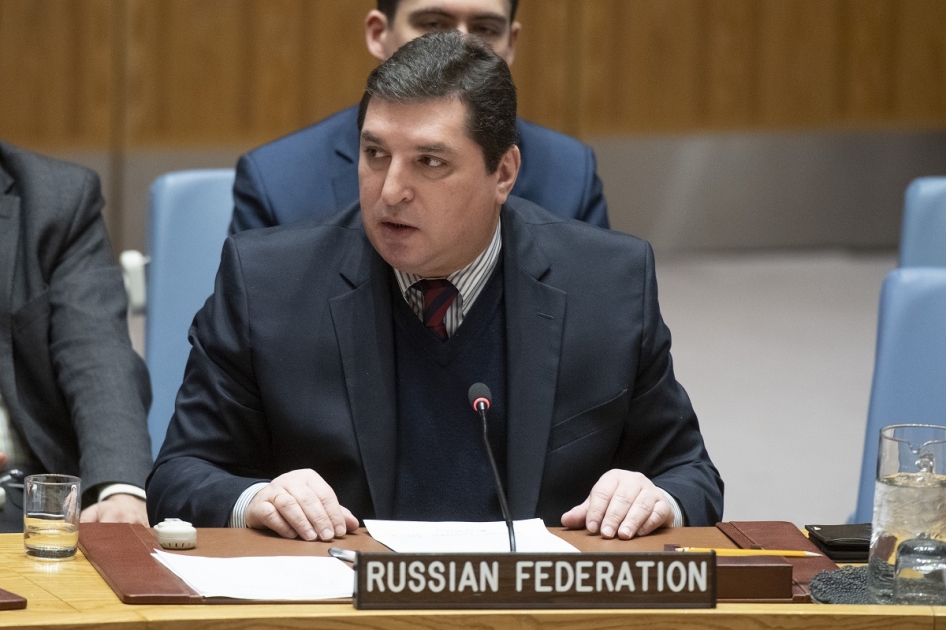Statement by Deputy Permanent Representative Vladimir Safronkov at the Briefing of the Chairperson of Committee 1540 at the UN Security Council
Mm. President,
We are thankful to the Permanent Representative of Indonesia, Ambassador Djani for his briefing on the activities of the Committee that was established pursuant to UN Security Council resolution 1540 (2004). Ambassador, we would like to thank you and your team for the conscientious efforts at the head of this important assistant body to the Council. We count of fruitful cooperation during the upcoming period. Ambassador Djani, we are committed to provide to you any possible assistance,
Security Council resolution 1540 is a cornerstone in the global non-proliferation architecture. Consensus approval of this decision by the Security Council in 2004 was the result of the joint US-Russian initiative that aimed to establish a firm legal and law-enforcement shield in order to prevent non-State entities, including terrorists, from getting hold of WMDs. Over the 15 years since then, we managed to jointly identify the problem that has become quite urgent by now.
Added value of resolution 1540 is in its being a tool for cooperation rather than for coercion or for imposing any ready-made ‘recipes’. The adoption of the resolution opened a new page of cooperation in collective counteraction to one of the serious challenges for the global stability.
The responsibility for the implementation of this decision of the Security Council rests with the Member States. International and regional organizations, industry, business, academia, and other segments of the civil society, play an important, still an auxiliary role in assisting the States to implement concrete provisions of resolution 1540.
Resolution 2325 that resulted from 2016 review process, made it possible to further strengthen the 'non-proliferation mandate' of 1540 Committee. It fostered the exchange and dissemination of best practices, stepped up the effectiveness of assistance to the States that need it, while taking into account their specifics and particular requirements.
Mm. President,
We are convinced that the task outlined by resolution 1977 regarding the all-encompassing review of the implementation of resolution 1540 should become central for the work of the Committee. In order to properly launch this process, at the first stage it is vital to convince States, international and regional organizations, business and academia to carefully consider the recommendations and observations that, in case of approval by consensus, will become fundamental for the mandate of a new auxiliary body of the Council for the period after April 25, 2021. We believe the Committee could convene an opened meeting on this matter and invite all the interested stakeholders. Some brainstorming would allow us to identify new tracks for cooperation.
We emphasize that the work of the Committee or its Group of Experts should be treated professionally, in accordance with the principle ‘do no harm.’ Establishment of additional bureaucratic mechanisms on the subject matter of 1540, limitation of experts’ contracts or induced promotion of radical, yet non-finalized proposals might aggravate bureaucratic procedures rather than enhance efficiency and promptness of this crucial mechanism.
Mm. President,
Countering the proliferation of WMDs is one of Russia’s military and political priorities. Like other urgent problems, this issue requires joint coordinated action of all States without exception. We need interaction and cooperation rather than confrontation.
We are interested in the search for joint positions with our partners in order to rapidly promote the non-proliferation agenda, especially given that the problems in this area only continue to exacerbate.
ISIS and other terrorist groups are still active in in the Middle East. They mastered the technologies of production of chemical weapons and they make use of this technology. In light of this, the importance of collective efforts to prevent the terrifying phenomenon of chemical terrorism is as high as never before. Besides, we have to act promptly, because as the situation in Syria is settling, terrorists who have gained practical expertise in using chemical weapons will be trying to flee to third countries.
Mm. President,
For our part, we plan to take active part in the work of the Committee. We count on constructive and meaningful cooperation with all the partners in order to implement all the provisions of resolution 1540 (2004) and prevent non-State entities from getting hold of WMDs.
Thank you for the attention.
